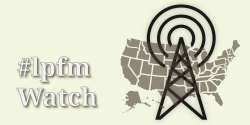We’re glad to add nine more low-power FM construction permits to the tally since last week’s report. This group includes Northern Arizona University, which Jennifer covered in her College Radio Watch, a public library and a few interesting community groups.
I’m really not sure how many public libraries in the US have their own radio stations, but the Allen County Public Library in Fort Wayne, IN just received a construction permit for 95.7 FM. According to its application, the library will work with the public television channel, Access Fort Wayne, with one goal being to serve listeners who can’t afford cable television. Along with hosting live call-in shows, providing a community calendar and covering local events, the new station will partner with the communication department at Indiana University-Purdue University Fort Wayne in developing a program for students to volunteer in daily operations.
The Utah Arts Alliance received a permit for 99.9 FM in Salt Lake City. The group plans public affairs programs about art, environment, current affairs, science and media education, as well as “a diversity of musical programming to encourage musicology.”
I’m cyclist, so it was cool to see a non-profit, community-centered bicycle shop in Sacramento, CA–The Sacramento Bicycle Kitchen–receive a new construction permit for 98.9 FM. Not surprisingly, the group proposes shows dealing with bicycle maintenance and alternative forms of transportation, as well as local art and music.
Finally, The Neighborhood Network of Columbus, OH will be able to go full-time on 92.7 FM and divest from a 50% time-share the group had on WCRS-LP at 102.1 FM. The station plans to expand its traditional community radio programming which intends to “educate the public by providing diverse underrepresented viewpoints that promote civic conversations on the air.”
Will Stations Keep Their Pledges?
When there are multiple applicants for one LPFM frequency (an MX group), one way the competition is resolved is through points assigned for a number of factors, like being a non-profit education organization.
Some factors are promises the applicant makes to the FCC, like pledging to keep an accessible main studio, and locally originating at least eight hours of programming a day. Of course, that means if an applicant receives a construction permit as a result of claiming these points then it’s supposed to follow through on these pledges.
Using the power of data mining, REC Networks has put together a nice little resource listing all of the stations that have made the main studio and local programming pledges. Right now the list only includes stations from the first window of MX groups in the states California, Colorado, Nevada, Oregon and Washington. Also, some of the data will change as MX groups are settled and some applicants inevitably drop out.
Nevertheless, this could be a good resource for listeners to check and see if their local stations are following through on their pledges to be true local stations.



